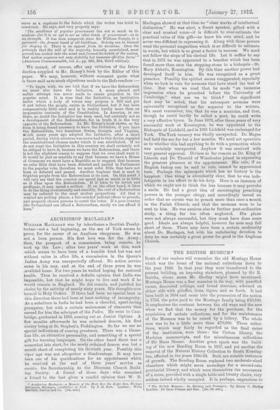ARCHBISHOP MACLAGAN.*
WILLIAM MACLAGAN was by inheritance a Scottish Presby- terian—not a bad beginning, as the see of York seems to prove, for the career of an Anglican clergyman. He w as not a born parson. His first love was for the Army ; then, the prospect of a commission being remote, he took up the Law ; after two years' work at this, work which seems to have been of a humble kind but was not without value in after life, a commission in the Queen's Indian Army was unexpectedly offered. No active service came in his way, and at the end of three years he was .nvalided home. For two years he waited hoping for restored health. Then he received a definite opinion that India was impossible, but that he might hope to live and work if he would remain in England. He did remain, and justified his choice by the activity of nearly sixty years. His thoughts now turned to Holy Orders. If there had been no special bent in this direction there had been at least nothing of incongruity. As a subaltern in India he had been a cheerful, sport-loving youngster, but with a certain seriousness of character that earned for him the sobriquet of the Padre. He went to Cam- bridge, graduated in 1856, coming out as Junior Optime. A few months afterwards he was ordained deacon, his first curacy being at St. Stephen's, Paddington. So far we see no special indications of coming greatness. There was a blame- less life, an attractive personality, and something of a special gift for learning languages. On the other hand there was a somewhat late start, for the newly ordained deacon was but a month short of completing his thirtieth year. Possibly this riper age was not altogether a disadvantage. It may have been one of his qualifications for an appointment which be received at the end of three years' service as curate, the Secretaryship to the Diocesan Church Build- ing Society. A friend of those days who remained a friend to the last gives a candid opinion that W. D.
• Archhisi.or Maciagon: a Memoir of the Mont Bor. fho Right lion. Wi tiara Dalrymple Maoluga rolthisho,, of York. By F. D. How. London: Wells Gurdacr, Durtou antiY, Co. [10s. net.]
Maclagan showed at that time no "clear marks of intellectual distinction." He was alert, a fluent speaker, gifted with a clear and musical voice—it is difficult to over-estimate the practical value of this gift—he knew his own mind, and be never was diffident in expressing it. Along with these powers went the personal magnetism which is so difficult to estimate in words, but which is so great a factor in success. We need
not follow the steps of his clerical life. Let it suffice to say that in 1875 he was appointed to a benefice which has been
found more than once the stepping-stone to a bishopric —St.
Mary Abbot's, Kensington. By this time another power had developed itself in him. He was recognized as a great
preacher. Possibly the epithet seems exaggerated, especially when we look in vain for sermons that have stood the test of time. But when we read that be made "an immense
impression when he preached before the University of Cambridge," what are we to think ? One significant fact may be noted, that his extempore sermons were universally recognized as far superior to the written.
We must remember, too, that he was a musician, and that, though he could hardly be called a poet, he could write a very effective hymn. In June 1878, after three years of very successful work at Kensington, he was appointed to the Bishopric of Lichfield, and in 1891 Lichfield was exchanged for York. The York vacancy was wholly unexpected. Dr. Magee had held the see for but a few months. We need not speculate as to whether this had anything to do with a promotion which was certainly unexpected. Anyhow it was received with very general approval. Divines so far remote as Dr. King of Lincoln and Dr. Thorold of Winchester joined in expressing the greatest pleasure at the appointment. His rule, if an English bishop can be said to rule, cannot be appreciated here. Perhaps the episcopate which has no history is the happiest. One thing is abundantly clear, that he was inde- fatigable in his effort to do his duty. Here is an instance of which we ought not to think the less because it may provoke
a smile. He had a great idea of encouraging preaching powers in the younger clergy, and accordingly issued an order that no curate was to preach more than once a month in the Parish Church, and that the sermons were to be sent to him. He was anxious also to further post-ordination study, a thing far too often neglected. His plans were not always successful, but they must have done some good. Ideals are always helpful, however far men may fall
short of them. There may have been a certain mediocrity about Dr. Maclagan, but with his unfaltering devotion to duty he was certainly a great power for good in the Anglican Church.






















































 Previous page
Previous page